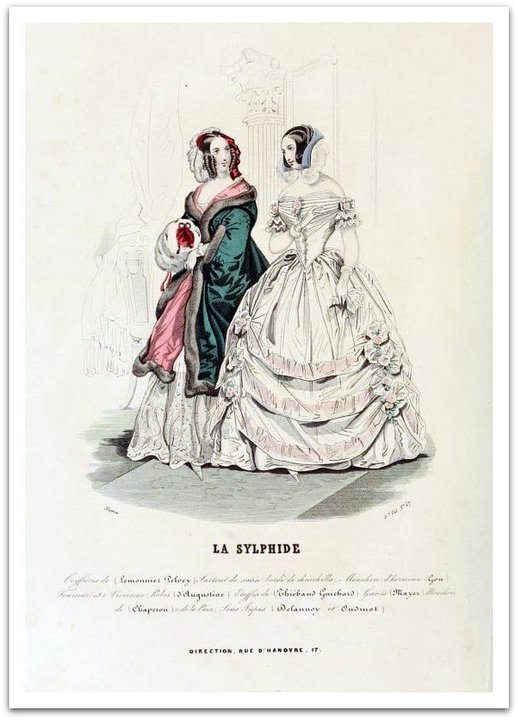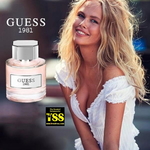An Early 1841 Guerlain Advertisement under the Monarchie de Juillet: The Consumption of Paris, Fashion & Perfume {Perfume Images & Adverts} {Scented Thoughts}
 It is somewhat an exotic sight yet not too far distant in time in psychological terms to see how early perfume advertisement purported to work in Parisian magazines. Apparently what was thought to work was repeated name-dropping in the midst of an "opinion" article on feminine fashion. Was the article mere pretext to earn dividends? In a 1841 issue of the magazine La Sylphide : Modes, Litératures, Beaux-Arts it reads so on one level. But it also more generally and deeply allows the author using the "I" to affirm an excited, overblown sense of Parisianism basing itself on a nascent ideology of consumerism.The ideology is clear: Paris is the center of the civilized world in terms of fashion, literature and the arts and I the author am its product and embodiment. Shaped by this glorious city, my mind, my taste, my whole being become extensions of the unquestioned reality of uncanny intellectual and material refinement of which Paris is the symbol and the standard-bearer...
It is somewhat an exotic sight yet not too far distant in time in psychological terms to see how early perfume advertisement purported to work in Parisian magazines. Apparently what was thought to work was repeated name-dropping in the midst of an "opinion" article on feminine fashion. Was the article mere pretext to earn dividends? In a 1841 issue of the magazine La Sylphide : Modes, Litératures, Beaux-Arts it reads so on one level. But it also more generally and deeply allows the author using the "I" to affirm an excited, overblown sense of Parisianism basing itself on a nascent ideology of consumerism.The ideology is clear: Paris is the center of the civilized world in terms of fashion, literature and the arts and I the author am its product and embodiment. Shaped by this glorious city, my mind, my taste, my whole being become extensions of the unquestioned reality of uncanny intellectual and material refinement of which Paris is the symbol and the standard-bearer...
The name of Guerlain is mentioned thrice within a short article rhapsodizing about muffs and handkerchiefs as being the ideal supports for wearing a perfume by the house. The author does not hesitate to present Guerlain as the pinnacle of all things perfumed. Established in 1828, they are said to be the only one to have mastered the art of the lasting perfume as well as that of the naturalness of floral bouquets. Those two more precise remarks possibly reveal more authentic categories of thinking about perfume: one can well accept the fact that lastingness was and remains a problem in perfumery as one of the hurdles to be overcome while the composition has to be something else than a support for that essential yet subordinate preoccupation. The naturalness of floral bouquets continues to be a worry for the English-garden variety of floral compositions even today.
Later on in the same magazine, in a different article, and with complete disdain for coherence, it is yet another perfumier which is cited, the long-forgotten Faguer-Laboullée, as the one and only possible resource for the "femme de bon goût" on a hunt for perfumes in the capital city, and possibly the world. The ideology of cultural imperialism in all things fashion is palpable.
This juxtaposition of absolute references betrays the advertising aims of the magazine, but also the ideology of Parisianism which sustains it revealing its links with a modern ideology of consumerist narcissism practising self-promotion and self-adoration mediated by the mythology of a City inhabited by superior denizens with access to superior corsets by Ferrière-Pénona, superior perfumes by Guerlain and Faguer-Laboullée, superior hankerchiefs by Chapron, superior perfumed sachets by Tachy, and other consumer goods to be highly coveted with Paris as its precious encasing shrine and validating backdrop.
Desire, narcissism, consumerism, and identity become an interplay of inter-reflective mirrors to sell and buy and further circulate one's identity, one's authority and simply put, the bottom-line: consumer goods.
"One thing that I find absolutely fascinating regarding muffs is the perfume that their warmth allows to preserve in odors. It is enough for a handkerchief dipped in Guerlain scents to have sojourned in one for several hours for the most suave aromas to escape from it for several days on. But for it to work, they must be by Guerlain as this famous perfumier is the only one who has found the secret to lasting fragrances and for imparting upon them the priceless exhalation of natural flowers. So many women are awaiting with trepidation for a promised bouquet from the house of Guerlain!"
And later on,
"One will have to have recourse to Mme Ferrière-Pénona, for just like one cannot procure anywhere else one's lace and corsets, it is forbidden to any woman of good taste to select her perfumes anywhere else but at Faguer-Laboullé."
What worked best apparently for selling goods with Paris as a reference point - one would say "co-branding" today - was to indulge in collective narcissistic delirium tremens believing each time that you could only procure the ultimate very best because you were in Paris and reading the Sylphide's absolute and contradictory yet flattering recommendations in an era when clearly-labeled advertisement was not even seen as an issue.
Image: http://ua-bal.livejournal.com/251204.html









